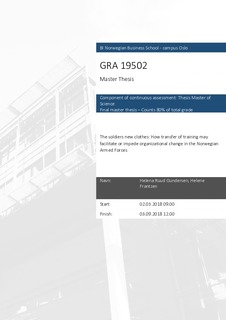The soldiers new clothes: How transfer of training may facilitate or impede organizational change in the Norwegian Armed Forces
Master thesis
Permanent lenke
http://hdl.handle.net/11250/2578603Utgivelsesdato
2018Metadata
Vis full innførselSamlinger
- Master of Science [1621]
Sammendrag
This dissertation seeks to develop the field of research on leadership development,
and the reasons why long-term training transfer in some cases are problematic or
even, in worst cases, non-existent. Based on the theory of Baldwin and Ford
(1988) on conditions of transfer, as well as mindset theory regarding how goals
are implemented and enacted, we aim to broaden the understanding of how
organizations might enhance the possible benefits of training transfer.
According to Baldwin and Ford (1988) more research is needed in order to
understand how learned material is generalized and maintained during the course
of action in the job context, and such conditions are rarely assessed by the
organization, nor the field of research. In this dissertation we have used
Gollwitzer’s (1990) theory of mindsets and action phases combined with Baldwin
and Ford’s (1988) conditions of transfer to help explain how conditions of transfer
affect the enactment of planned behavior in an organization.
In order to investigate this problem formulation we have developed three
exploratory research questions based on a study by Webb and Sheeran (2006).
The three questions we seek to answer is; (1) How can perceived supervisory and
peer support affect the conditions of learning transfer?, (2) How can perceived
behavioral control influence the intention to generalize and maintain learned
material to the job context?, and (3) How can prior behaviors affect the
conditions of learning transfer negatively?
A case study of the Norwegian Armed Forces has been conducted in order to
investigate the problem formulation, as they have recently implemented a new
military personnel system. The new system for military personnel is aimed at
facilitating experience-based and specialized competencies, with the intention of
providing the personnel with more continuity and professional career
opportunities (Forsvaret, 2016b). The new military personnel system promotes
two different career hierarchies for personnel within the Norwegian Armed
Forces, forcing changes in leadership role and responsibility. As such, it should be
interesting to look at whether the Norwegian army has been able to enact their intended role changes, and the training transfer this requires, or if there exists a
gap between planned behavior and transfer of training.
The study was conducted through semi-structured interviews of 14 participants in
the Norwegian Armed Forces. These participants were seperated into 3 categories;
OF, OR and Converts. Whereas the Converts were to only participants who
transferred from OF to OR as a result of the new military personnel system.
However, each group experienced new roles and responsibilities.
The results of this study suggests that all participants experienced high
supervisory support, high behavioral control and they did not experience any
trouble with previous learnt behavior in their new role. As such, the Norwegian
Armed Forces should have experienced training transfer on all levels of the
organization. However, the study showed that Officers and Specialists at the lower
levels of the organization had the intention to act, but failed to change their role.
As such, other factors than those mentioned in this dissertation could be to blame.
We suggest that it might be the structural support that has created the gap between
intentions and actions, and thus affected the enactment of planned behavior
(Training transfer) in a negative way. As the participants belonging to the convert
category reported that they had been able to change their role, but the participants
in the OR and OF category still found the implementation to be ambiguous it
might seem as this is due to the lack of resources and knowledge at the lower
levels in the organization. However, this will require further research.
Beskrivelse
Masteroppgave(MSc) in Master of Science in Leadership and Organizational Psychology - Handelshøyskolen BI, 2018
